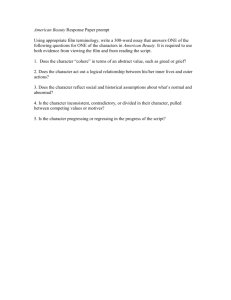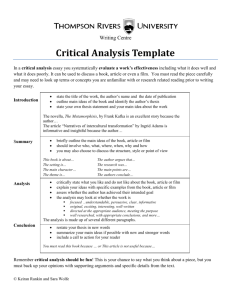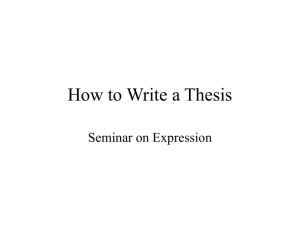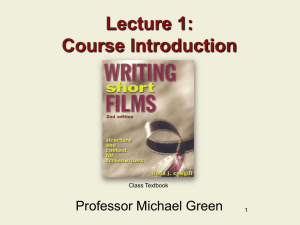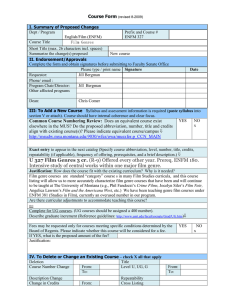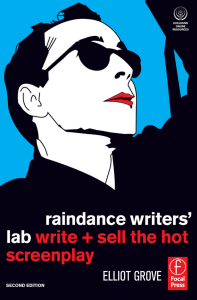Document 10758030
advertisement
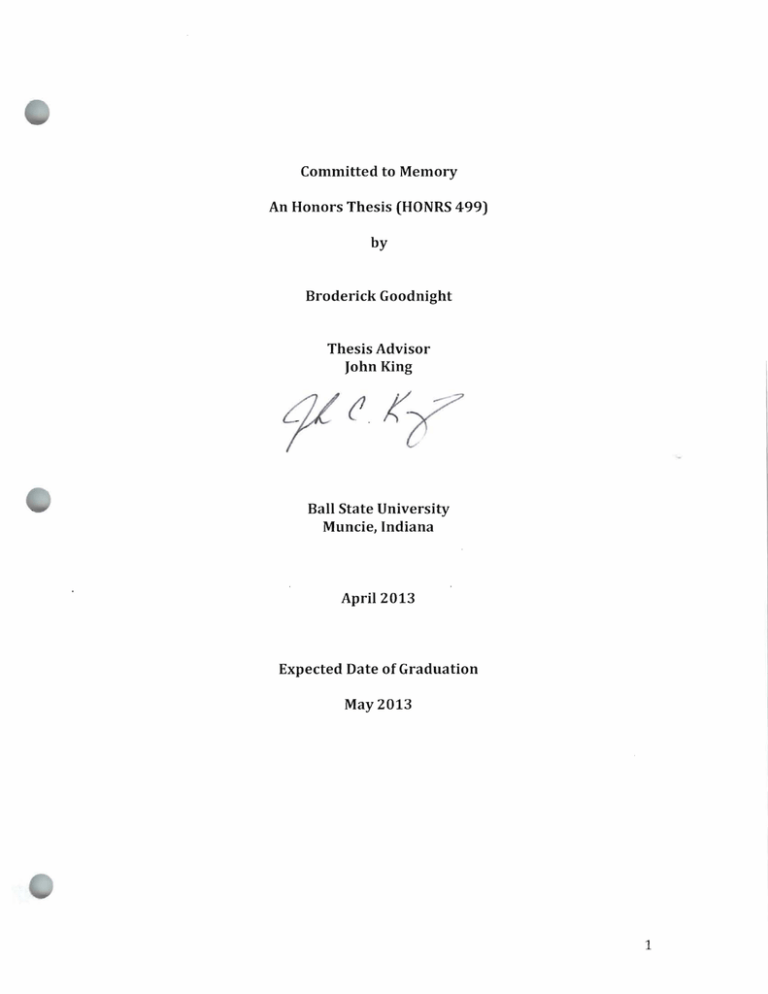
Committed to Memory An Honors Thesis (HONRS 499) by Broderick Goodnight Thesis Advisor John King Ball State University Muncie, Indiana April 2013 Expected Date of Graduation May 2013 1 Abstract: 't't8 i~~3 • lelo Technological progress is occurring more and more rapidly as the years go by. Our attention has become focused on our interactions with these advances} whether it be computers} cell phones} television} or social media. Committed to Memory is the story a woman struggling to adjust to a world like ours in the near future} only technology isnt just at the forefront of our minds} but within our minds themselves. When her ineptitude puts the future of her and her family}s well being at risk} she takes to the road with her tech-savvy friend to right her mistakes. Along the way} she comes across various individuals who have been affected by her companis technology in different ways} learning both the positives and negatives of a world constantly "plugged in/' as well as where she stands in relation to her society. I hope that by bringing the audience along on this hero's story} they will think about their place in The Age of Infornlation as well. Acknowledgements: I would like to thank John King for his support} insights} and constant efforts put into reviewing} critiquing} and teaching over the course of this project. I would also like to thank the countless amount of friends} peers} and teachers I have been able to connect with} both in person and over various media} who both challenged and inspired the roots of this project. ­ 2 Broderick Goodnight Honors Thesis April 22, 2012 Author's Statement Writing a full-length feature screenplay over the course of one semester can be easier said than done. Though something like a novel or a play may carry a higher badge of honor within the artistic community, a writer must make a choice early on as to what medium is most appropriate for the story that he or she wants to tell. As a telecommunications major writing a script about technology and the media, a film script feels the most appropriate for this project. It not only compliments my passion and college experience, but my subjects and target audience for the project are those who would be more likely to see a film than read a book or spend an evening at the theatre. In many ways, the people who consume media like movies and TV shows at a rapid rate are my focus and my inspiration. Within my major, everything moves quickly. Get the newest story o~t for the evening news. Promote the newest film and keep it in the public consciousness. If your audience hasn't thought about your movie today, you will get lost in the media circus. Keep up with the newest developments in technology. What may be the standard this year could be outdated by next year. The media doesn't just affect those who work within it either, but rather affects all of society. The best I could do was hold a mirror up to the world around me and describe what I saw. I realized I was looking at what has been colloquially referred to as liThe Information Age." Everything around me is more or less free. At the library, there is not a single book I have wanted to which I couldn't get access. With films, music, or TV shows, I simply can request the purchase of a new piece of media that I want to see for absolutely free, and have done so a few times. Because of the Internet, that ability doesn't apply only to me. The public domain allows for many of the greatest works of all time to be downloaded for free and in complete legality, while anything other piece of media exists on the Internet in some form. Today, everyone who wants to know anything about the past can know it. There are very few mysteries or feelings of wonder. Everything is a click away. Despite this overabundance available to us, society can't find the time for all of this information. There's no time to sit down and read or put on an album and listen. Many times a film will be on while someone surfs the web, texts their friends, plays a game, or works on homework. This can even all occur at the same time. The past has past, and if we want to keep up with current media and information, there's no time to go back. We have the need to keep moving forward, even if disregarding the still-practical innovations of the past may not be in our best interest. The time we spend appreciating the media that we spent so much time creating has been taken more and more for granted. In my screenplay, I wanted to write what I saw around me and take these trends into a possible near future. My characters would live in an environment where the progress of our world has ingrained itself so well into their society that my characters can look back at today in hindsight and see where my hypothetical foresight came from. If hindsight is 20/20, then going to the future and looking around would give a clearer indication of the present. Despite being an ambitious idea, a notion of where I wanted to go with my project, and knowing what I wanted it to accomplish, I knew that my pursuits were still abstract and vague. I needed to translate these feelings into something more substantive that my audience can see and hear in a movie theater. Perhaps through my story, I could be a true artist, reflecting society in that mirror, and my audience could see into that mirror, too. In making the idea of a rapidly moving media more concrete, I asked myself: What is the next big thing? My answer finally came to be the MemDrive that my entire script is based around. The time problem in our The Information Age is solved. Thoughts, ideas, and media can be automatically downloaded into the brain. People no longer have to worry about engaging in a book to know its content because they can know the text backward and forward instantaneously. I feel that if this technology were possible, this device would be exactly what the society of today would want. With the MemDrive effectively invented within the world of my story, I had free range to relate it back to our world and see the results that its presence would cause, almost in the same way that our Information Age affects us now. What results occur when today's values are driven to a further extreme? My first challenge came in integrating my symbolic device into a narrative. The point of creating the MemDrive would have no effect if I couldn't also create relatable characters, an understandable society in which to place the MemDrive, and a story that could somehow exemplify my themes in relation to the human experience. I have written and directed many shorts for my classes} but I had never attempted to write a feature length script before. I set out writing an outline at the suggestion of my advisoc John King. Each scene in the outline would be a brief description of what was going to happen and needed to work to progress the story. Early on in the semestec the tone became an issue for me. Because I always saw the story as a satire} I realized that my initial approach of a detective solving a MemDrive crime and uncovering an information conspiracy played too heavy­ handed. My main character couldn}t interact with the events of the story because of his need to be discreet at all times. My advisor and I agreed that despite playing to my theme} the main character would have to be someone who was actively affecting the events of the story. From here} I completely reworked the piece} all still in good time. I decided to go closer to my original goal of making the story a comedic satire} with each character serving as a blunt representation of a behavior that I was trying to mock. However} as I got into the scripting stage} I found that the characters I created were becoming more and more human to me. John really pushed me to look into my characters} past and discover who they were} and as a result} I found more and more of myself being put into them. Though I started with a serious tone and then drifting to more attenlpted comedy} I think my final product balances a lighthearted tone that doesn}t get weighed down in its own seriousness} while at the same time gives my characters a depth to which people can ultimately relate. Just as my main character} Jane} grows to understand her place in the ever­ changing technological world} traveling alongside her has also allowed me to become more self-aware. In the end, I think the lesson she learns is one that I have ended up teaching myself. Also like Jane, the environment I find myself in plays a major role in allowing that to happen. Both John and Ball State University itself have pressed to me to question, criticize, evaluate, rethink, and find creative solutions for my obstacles. Doing this thesis for the Honors College has allowed me to need to set aside time from the rush of my field to reflect on it and create a story both personal and relatable. I feel the product I have produced in these pages truly acts as an accumulation of my time here at Ball State University. The reason I chose this school four years ago was because of a passion for film and its portrayal of the human experience on the screen. I have now written my first feature length film that not only feels true to my experience, but also hopefully fulfills my goal of something I create being important enough to someone else that it holds some relevance in his or her life. This screenplay even has the possibility of a life beyond this institution as something that I can carry with me to en1ployers. Maybe one day I can see it realized on the big screen. Even if not, this screenplay is a first step in many more I hope to write. I have learned so much more about myself, how I can realize my goals, and developed the skill set possible to be a storyteller, able to translate an idea into a creative product of passion and meaning.
